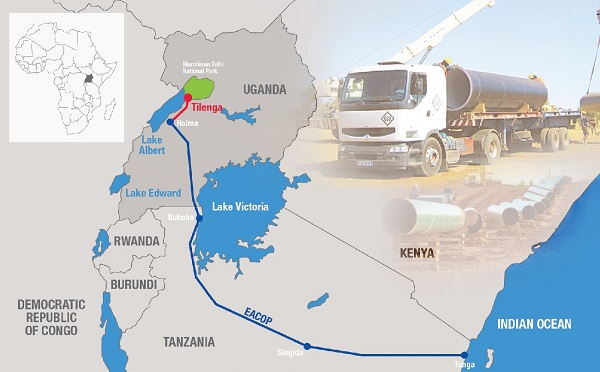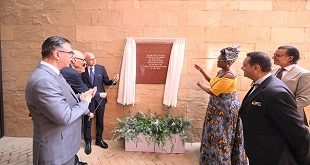
Arusha, Tazania | THE INDEPENDENT | The East African Court Of Justice has asked activist groups to file a written submission in an appeal seeking to overturn a ruling that sought to block the construction of the East Africa Crude Oil Pipeline (EACOP) project.
The regional court sitting in Arusha in November 2023 threw out a case in which activist groups including the African Centre for Energy Governance (AFIEGO) had filed the pipeline project between Uganda and Tanzania.
The Court then ruled that it had no jurisdiction to hear the case by AFIEGO and others because the case was filed too late or out of time.
But AFEIGO, Center for Food and Adequate Living Rights (CEFROHT)-Uganda, Natural Justice (NJ)-Kenya, and Centre for Strategic Litigation (CSL)-Tanzania, appealed against the ruling in a case they had filed in November 2020.
On Tuesday, The Appellate Division of the East African Court of Justice (EACJ) accepted the appeal and asked the activists to file written submissions by March 22, 2024.
The court also asked the governments of Uganda and Tanzania as well as the Secretary General of the East African Community (EAC) who are the respondents in the case, to file their counterarguments by April 22, 2024.
AFEIGO and others argued that the EACOP violates key East African and international treaties and laws including the East African Community (EAC) Treaty, Protocol for Sustainable Development of the Lake Victoria basin, Convention on Biological Diversity and the United Nations Framework Convention on Climate Change. Others include the African Charter on Human and People’s Rights as well as the African Convention on Conservation of Natural Resources among others.
The Court also ordered the activists to file any rejoinders to the counter-arguments to be submitted by the governments of Uganda and Tanzania as well as the EAC Secretary General by May 6, 2024.
AFIEGO’s Chief Executive Officer, Dickens Kamugisha in an interview said that they are happy that the court has set in motion processes to ensure that justice is served for the benefit of communities.
“Communities and East Africans in general rely on their natural and other resources to make a living and any projects such as the EACOP that threaten these resources should be challenged. Those challenging harmful projects should be supported by East Africans and other people of goodwill,” he said
Meanwhile, Farida Aliwa, the Executive Director of Natural Justice said they look forward to getting back to the court in a month with our detailed written submissions.
“We are committed to protect both the environment and the well-being of the people in East Africa. We believe our submissions will help the court understand the environmental impact of the pipeline” said Aliwa She said they want the court to recognize how the pipeline affects the environment and the delicate ecological balance we work hard to maintain. “We are determined to present our case and support the sustainable future of East Africa,” she added.
The East African Crude Oil Pipeline (EACOP) is a 1,443-kilometre (900mile) heated pipeline that will run from the oilfields in Lake Albert in Northwestern Uganda to Tanzania’s Indian Ocean port of Tanga. Uganda and Tanzania have persistently denied that the EACOP project which is to cost about $5 billion to construct will not have any adverse effects on the environment as suggested by environmental and human rights activist groups.
Background to the petition On November 6, 2020, four civil society entities from Uganda, Kenya and Tanzania filed a court case against some of the East African Crude Oil Pipeline (EACOP) project at East African Court of Justice (EACJ).The applicants are Centre for Food and Adequate Living Rights (CEFROHT)-Uganda, Africa Institute for Energy Governance (AFIEGO) from Uganda, Natural Justice from Kenya and Centre for Strategic Litigation from Tanzania.
The case was filed against the governments of Uganda and Tanzania as well as the Secretary General of the East African Community (EAC). In the case, the applicants argue that, among other things, the EACOP project contravenes the EAC Treaty, Protocol for Sustainable Development of the Lake Victoria basin, Convention on Biological Diversity and the United Nations Framework Convention on Climate Change.
******
URN
 The Independent Uganda: You get the Truth we Pay the Price
The Independent Uganda: You get the Truth we Pay the Price


